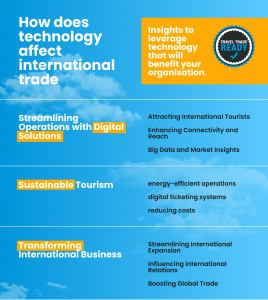How Does Technology Affect International Trade in Practice?
The intersection between technology and international trade is reshaping the tourism sector at an increasingly rapid pace. Understanding how technology affects international trade can provide pivotal insights for tourism professionals aiming to leverage these advancements to benefit their organisations.
Here, we will go in-depth, exploring answers to the question “how does technology affect international trade?” and how new technologies are changing the travel trade as a whole.

Streamlining Operations with Digital Solutions
The operational aspect of tourism has seen tremendous growth thanks to technological innovations, so how does technology affect international trade from a consumer perspective? Online booking systems, virtual tours, and automated customer service solutions like chatbots – they have all helped to streamline operations and enhance customer experience. This shift not only helps in managing resources more efficiently, but it also plays a crucial role in how technology affects international trade by making cross-border transactions smoother and more reliable.
Case Study: Attracting International Tourists
Attracting international tourists requires an in-depth understanding of market dynamics and consumer behaviour. The integration of technology in this strategy is detailed in our guide to how to attract international tourists, which emphasises the importance of technology in crafting targeted marketing campaigns that resonate with international audiences. An understanding of this approach is vital to also understanding how technology affects international trade, as it bridges the gap between local offerings and global markets.
Enhancing Connectivity and Reach
One of the most significant impacts of technology on international trade within the tourism industry is the enhanced connectivity between countries and markets. Advanced communication tools and digital platforms have simplified the process of reaching a global audience, allowing tourism professionals to promote their destinations and services more effectively. For example, digital marketing strategies can be tailored to target international tourists, as detailed in our guide to international tourism marketing, which provides actionable insights on crafting appealing content for diverse audiences.
Big Data and Market Insights
Big data analytics is a game-changer in answering today’s target question – again, ‘how does technology affect international trade?’ – since big data is changing how tourism businesses understand and cater to international markets. By analysing large sets of data, organisations can predict trends, tailor services, and create personalised experiences that attract international tourists. Understanding how technology has changed global trade in this context highlights the shift towards data-driven decision-making, which enhances competitive advantage and fosters growth.
Sustainable Tourism
Sustainability is a growing concern in international trade, especially in the tourism industry – and technology offers various tools that help businesses operate sustainably without sacrificing service quality. From energy-efficient operations to digital ticketing systems that reduce paper use, technology’s role in sustainable international trade is crucial for the long-term health of the tourism sector.
Transforming International Business
Technology has undeniably transformed international business by reducing barriers to entry and fostering an inclusive market environment. How does technology affect international trade for small to medium enterprises? SMEs now have the tools to compete on a global scale. Digital platforms enable them to showcase their offerings internationally, drastically reducing the traditional costs associated with entering foreign markets. This facet of how technology affects international trade democratises access to global customers, allowing more players to participate in international markets.
Streamlining International Expansion
The process of going international is fraught with challenges, from understanding local regulations to managing logistics across borders. Technology simplifies these complexities through solutions like cloud computing and international e-commerce platforms, which manage and streamline operations and compliance. As we continue to explore how technology affects international trade, it’s clear that these tools not only reduce the overhead and risk associated with global expansion but also accelerate the speed at which businesses can move into new markets.
Influencing International Relations
The role of technology in shaping international relations is profound. In tourism, technology facilitates better cultural exchange and understanding through immersive experiences like virtual reality (VR) tours and real-time language translation tools. These technologies foster a deeper connection between diverse populations, promoting peace and mutual respect. Moreover, digital diplomacy tools are enhancing how countries negotiate and maintain international ties, further highlighting how technology affects international trade in the context of trade and beyond.
Boosting Global Trade
How technology has changed global trade is evident through the digitisation of trade processes. How does technology affect international trade in tourism? The availability of online booking systems and global distribution systems (GDS) allows for seamless transactions that accommodate a surge in international travel, reflecting a direct impact on global trade growth.
Conclusion
Technology’s integration into international trade has revolutionised how businesses operate on a global scale. From enhancing connectivity and streamlining operations to influencing international relations and increasing trade volumes, the impacts are both profound and transformative.
As technology continues to evolve, its role in facilitating international trade will undoubtedly expand, offering new opportunities and challenges for tourism industry professionals. Embracing these technological advances is crucial for those looking to leverage their potential and turn global challenges into opportunities.
For further insights into adapting to these technological advancements, explore how technology is changing the travel and tourism industry. We hope that this post has helped you answer the question “how does technology affect international trade?”, and given you motivation to understand current trends and start anticipating future shifts – in order to ensure that your organisation remains at the forefront of the international trade landscape in tourism.


